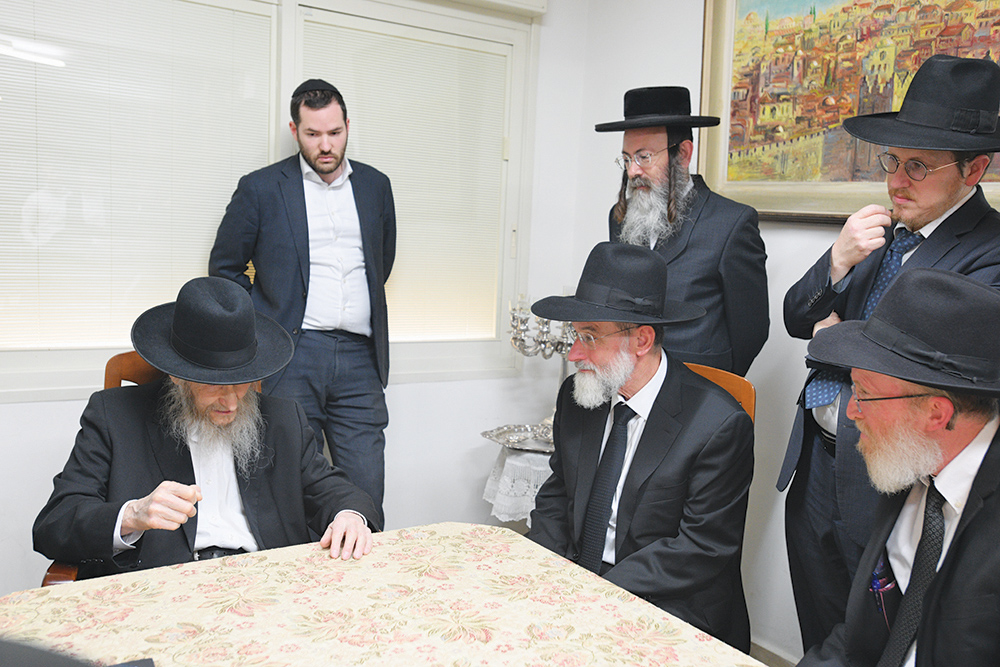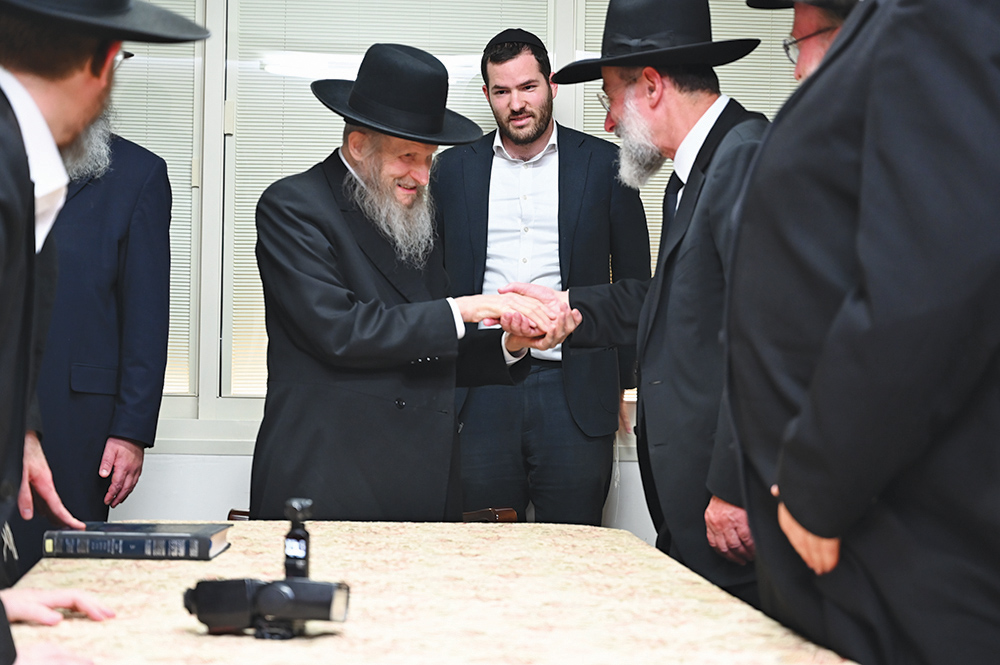Rav Don encourages daily mussar learning in Dirshu’s Kinyan Chochma Program.

“I feel such a sense of chibah, of love for this gathering of avreichim who have taken upon themselves the learning of daily mussar with a program. Of course, we are so fortunate in our generation to see the tremendous increase in limud haTorah hakedoshah, nevertheless, this gathering has an additional component that makes it special. Today, we are celebrating the combination of learning mussar with Torah. When Torah learning is complimented by the learning of mussar, it is a different Torah learning!”
Those were the words of the venerated mashgiach, HaGaon HaTzaddik HaRav Don Segal, shlita, at a unique gathering in his home to celebrate the completion of the Sefer Chovos Halevavos in Dirshu’s Kinyan Chochma Mussar program, together with the commencement of the Sefer Orchos Tzaddikim.
Dirshu’s Kinyan Chochma Mussar program was established six years ago at the Dirshu Convention in Stamford, Connecticut. Its purpose was to elevate lomdei Torah in their avodas hamiddos and grant them the extra push that is specifically needed in our generation in the constant battle against the yetzer hara. The program follows a daily mussar calendar with limudim from the classical mussar sefarim such as the Chovos Halevavos, Mesilas Yesharim, Orchos Tzaddikim, Tomer Devorah, Shaarei Teshuva, Rabbeinu Yonah on Pirkei Avos and Orchos Chaim L’Harosh.
Sequel to Meeting at the Home of HaGaon HaRav Gershon Edelstein, zt”l
Just a few months ago—at the end of Shevat—a special asifa was held at the home of the gadol hador, HaGaon HaRav Gershon Edelstein, zt”l, who recently passed away. Rav Don, who attended that meeting, played an integral role in encouraging the learning of mussar. That meeting was attended by many senior mashgichim from Eretz Yisrael. Rav Gershon himself—despite his weakness—delivered a drasha passionately encouraging that every avreich should make daily mussar an integral part of his schedule and then, praised the Dirshu Kinyan Chochma program as an important vehicle to achieve that purpose.
The more recent meeting held at the home of Rav Don Segal was a sequel to the original meeting in Rav Gershon’s home. Rav Don was deeply gratified that the Sefer Chovos Halevavos had just been completed by thousands who were now embarking on the Sefer Orchos Tzaddikim.
At the meeting in the home of Rav Don, a group of those who had recently completed the Sefer Chovos Halevavos was present along with senior members of Dirshu’s hanhala led by Dirshu’s Nasi, Rav Dovid Hofstedter, shlita, who also addressed the gathering.

The Mussar Obligation
Rav Don explained that limud hamussar is something that every single Jew is obligated to engage in, yet—at the same time—it is especially significant when talmidei chachamim who learn Torah all day make the time to learn mussar. Why? Because when everyone sees that even talmidei chachamim who are engaged in spiritual matters all day, also attach great importance to the learning of mussar, they will realize how important it is for them as well.
Not only that—Rav Don continued—but if a talmid chacham wants his Torah learning to stand by him and imbue him with the kedushah and taharah that Torah learning accomplishes, it can only be done when coupled with limud hamussar and yiras shamayim (fear of heaven). In fact, the mishna tells us that only when one’s yiras shamayim precedes his chochmah, will his Torah learning leave a lasting impact.
The Common Denominator Between Rav Chaim Volozhiner And the Divrei Chaim
Then—in a voice full of emotion—Rav Don exclaimed, “Do you know how great Rav Chaim of Volozhin was in Torah?! He was the primary talmid of the Vilna Gaon, he was the founder of the Volozhiner yeshiva and, yet, he writes that if a talmid chacham is in the middle of learning and feels that he is somewhat cooling off in his yiras shamayim, do you know what he should do? He is allowed to stop his learning and learn some mussar until he feels that he has strengthened himself in yiras shamayim. Only then can he return to his learning! That is how important learning mussar is!”
Rav Don, then, continued with a fascinating story about the father of Tshebiner rav whose name was “Rav Yaakov,” the rav of Horimlov. “Rav Yaakov” or “Rav Yekele”—as he was fondly called—was one of the greatest gaonim of his time. He never forgot anything he learned and his gaonus was simply astounding, even in his generation.
“He once met with the famed Divrei Chaim of Sanz, who was also a great gaon, and they began talking in learning. Before long, a raging Torah debate ensued between the two gaonim. They were so deeply immersed in the intricacies of the sugya that Rav Yaakov was surprised when in the middle, the Divrei Chaim grabbed his peyos and said, ‘Yekele, do you remember that there is a Borei Olam?!’”
“This was the same Divrei Chaim who prepared for tekias shofar on Rosh Hashanah by learning a deep sugya in the Sefer Ketzos Hachoshen. What was he saying?! Even in the midst of learning the deepest sugya, a Yid cannot forget about Hashem! His yiras shamayim must always be foremost.”
Rav Segal expressed his tremendous satisfaction that so many people were learning mussar in the program and that they were now starting the Sefer Orchos Tzaddikim, a sefer that is based on many other earlier mussar works from various Rishonim that are brought down in easy-to-read, concise language making it easier to absorb the lessons.
Dirshu also has made available recorded shiurim on the Sefer Orchos Tzadikim delivered by Rav Zev Smith, shlita, maggid shiur, Dirshu Daf HaYomi B’Halacha and Irgun Shiurei Torah. They can be accessed by calling Kol Halashon at 718-906-6449 3-1.
The Best Insurance Policy
He then concluded that it is important that younger people have older mussar role models to watch and emulate. “When I learned in the Ponevezh yeshiva, there were several elder talmidei chachamim and tzaddikim who did not have official jobs in the yeshiva, but whom the Ponevezh Rav fully supported so they should be in the beis medrash and serve as role models for the talmidim on how a person with true yiras shamayim conducts himself. I remember there was a Yid named, “Rav Leizer.” He had been a maggid shiur in Slabodka before the war. When the Rav asked the Chazon Ish if he should buy an insurance policy for the yeshiva, the Chazon Ish replied that, “As long as Reb Leizer is learning there, you don’t need insurance. He is the best insurance policy.”
Indeed, perhaps, the best insurance policy that anyone can have, is to incorporate daily learning of mussar into his schedule.
Don’t wait… Now is the time to join Kinyan Chochma. With just a few minutes of learning Kinyan Chochma per day, your whole day will be transformed.
For information on how to join Kinyan Chochma and to receive a copy of the day’s limud, please call Dirshu at 1-888-5Dirshu or email info@kolleldirshu.org.








